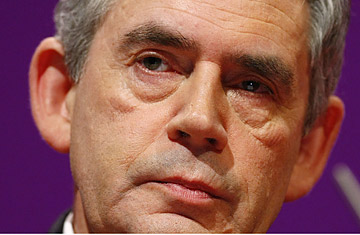
British Prime Minister Gordon Brown
If Britons harbor doubts about their politicians — and surveys suggest that they trust them only fractionally more than they trust tabloid reporters — then this week's annual conference of the governing Labour Party may have reinforced their skepticism. For the convocation of activists and career politicians in the northern English city of Manchester was choreographed to banish the one ingredient it purported to promote: public debate. On that measure, Labour scored a resounding success.
Sure, there was debate — fervid, red-faced debate that sometimes came close to tears and blows — but those exchanges were consigned to hotel bars and fringe meetings. All arguments centered on a single issue: Can Prime Minister Gordon Brown win over increasingly fractious critics? Should Labour dump him in the hopes that a successor would rescue the party from its historic depths of unpopularity? Or would such an ouster unleash infighting that would shred what it was meant to save?
For months now, opinion polls have been predicting that Labour faces possible annihilation at the next election, due by spring 2010. The data pinpoints Brown as a liability. When he replaced Tony Blair, voters saw in the serious Scot a refreshing change from his predecessor's slick style. But Brown's deliberative approach has come to appear indecisive; his detail-heavy, poetry-free utterances have failed to connect with voters. He acknowledged these failings in his speech to the delegates. "I didn't come into politics to be a celebrity or to be popular," he said, adding, "Perhaps that's just as well."
With a salvo of new policy initiatives and a volley of contempt against his opponents, Brown gave Labour members a reason to cheer. But by that evening, the delegates' euphoria was ebbing once again, as they contemplated the scale of the recovery needed if Labour is to secure another term.
Despite deep disagreements about how such a turnaround might be achieved, there's one point of unanimity: disunity is toxic. "Divided parties don't win elections," Ed Miliband warned a rally in Manchester. His elder brother, Foreign Secretary David Miliband, declared his loyalty to Brown, but he is seen as the front runner to replace the PM, and relations between the Foreign Office and Downing Street of late have been about as cordial as those between Britain and Russia. And though David Miliband has not done so himself, some MPs have called for a leadership contest, among them Fiona Mactaggart, a former minister. "I think Labour can win, but I don't think we can win with Gordon in charge," she says.
Those close to Brown, of course, disagree. "Brown will lead Labour into the next election, and Labour will win the next election," insists Charlie Whelan, once Brown's imagemaker and still one of his most enthusiastic cheerleaders. "In the last days, people close to Hitler kept telling him it was still possible to win," retorts a former government adviser. "That's what the people close to Brown are like." But there's some cause for optimism in the bunker: only a year ago, Brown was riding high and his Conservative counterpart, David Cameron, was in the doldrums. The speedy reversal in their fortunes recalls the old dictum that a week is a long time in politics.
Two weeks is even longer, and the days before the conference served up events that could yet redraw Britain's political landscape. Brown was regarded as a skillful and successful Finance Minister in the Blair years, when he positioned Labour as a champion of free markets. In Manchester he took a new tack. "The continuing market turbulence shows why we need a new settlement for our times," he said, announcing proposals to "rebuild the world financial system." That's a massive ambition for a man struggling to control his own party, but the U.S. pollster Stan Greenberg, in Manchester on a brief break from advising Barack Obama's campaign, believes it offers Brown's best hope for survival. "If there's going to be a comeback, it will be through managing the current economic crisis," says Greenberg. Pressed to name leaders who have rebounded from such a low ebb, Greenberg cited Margaret Thatcher, who was widely unpopular until she dispatched British troops to win back the Falkland Islands from Argentina. "What Gordon needs is a small war," he joked. There are none in sight, but — odd though it may sound — economic woes may yet give him some respite from the mutiny within his own ranks.
